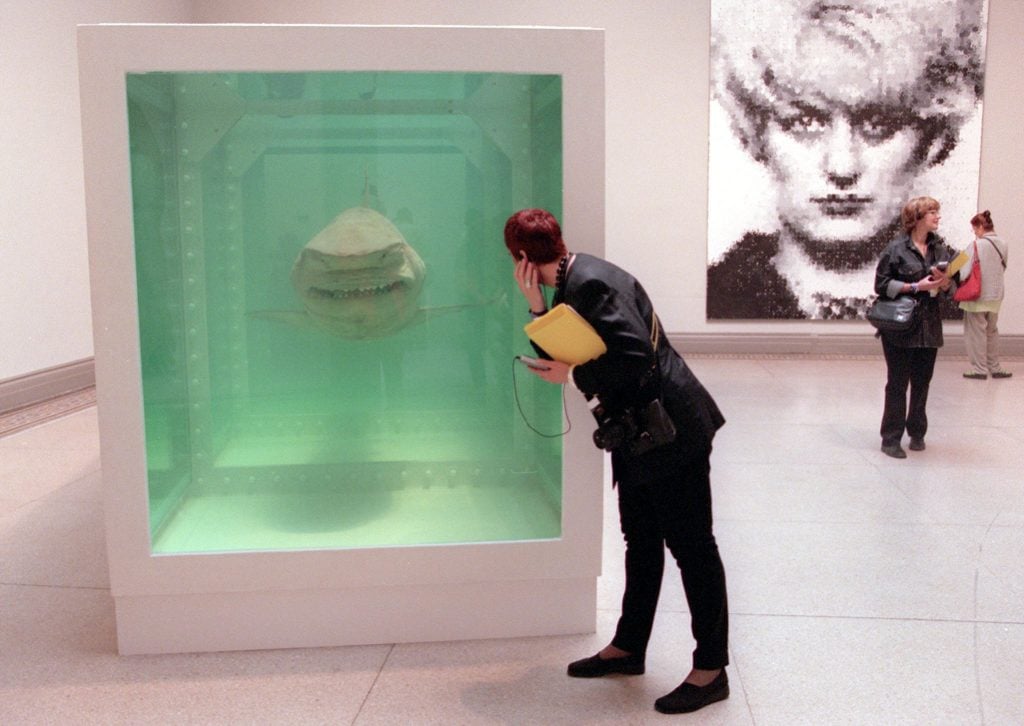Art World
Damien Hirst Backdated Signature Formaldehyde Sculptures, U.K. Paper Reports
The artist's team has defended the dates, saying that they correspond to when he conceived the pieces.

The artist's team has defended the dates, saying that they correspond to when he conceived the pieces.

Eileen Kinsella

Call it a tempest in a shark tank!
Damien Hirst backdated at least three of his signature formaldehyde tanks featuring preserved animals, claiming that they are far older than they are, the Guardian reports.
According to the U.K. paper, three Hirst sculptures—variously containing a dove, a shark, and two calves—that have been exhibited recently at galleries in New York, Hong Kong, Munich, and London as pieces from the 1990s were actually produced just a few years ago.
The “three were made by Hirst’s employees at a workshop in Dudbridge, Gloucestershire in 2017,” journalist Maeve McClenaghan writes. “The artworks first appeared at an exhibition at Gagosian’s Hong Kong art gallery that same year. The show, ‘Visual Candy and Natural History,’ was billed as an exhibition of the artist’s works ‘from the early to mid-1990s.’”
Science Ltd., Hirst’s art-making company, defended the dating in comments to the Guardian. “Formaldehyde works are conceptual artworks and the date Damien Hirst assigns to them is the date of the conception of the work,” it told the paper. “He has been clear over the years when asked what is important in conceptual art; it is not the physical making of the object or the renewal of its parts, but rather the intention and the idea behind the artwork.”
However, Hirst’s attorneys also admitted that he has not been consistent in his dating methods. While using the date of conception is the artist’s “usual approach” for formaldehyde works, he has also sometimes gone with the date the sculpture was physically produced. “Artists are perfectly entitled to be (and often are) inconsistent in their dating of works,” the lawyer’s said in a statement.
Artnet reached out to Science Ltd. and was told that Hirst’s studio is not commenting further. A representative for Gagosian Gallery declined to comment.
According to the Artnet Price Database, the record for a Hirst formaldehyde work at auction is $18.6 million (£10.3 million) paid in 2008 for The Golden Calf (2008), which was sold Hirst’s infamous direct-to-market auction of new work at Sotheby’s London in 2008, titled “Beautiful Inside My Head Forever.”
In 2004, hedge-fund billionaire Steven A. Cohen reportedly paid at least $8 million for Hirst’s most famous formaldehyde, The Physical Impossibility of Death in the Mind of Someone Living (1991), which includes a preserved tiger shark.
The three sculptures under scrutiny had never been seen in public before the 2017 show in Hong Kong, according to the Guardian‘s investigation. They are Cain and Abel (1994), which contains the twin calves; Dove (1999), which has a bird with wings outstretched; and Myth Explored, Explained, Exploded, (1993–99), which contains a shark, dissected into three pieces. The latter is currently on view in a Hirst survey at the Munich Museum of Urban and Contemporary Art.
The claims of the backdating are based on unnamed sources who said the works were less than a year old when shown at the 2017 Hong Kong show. There are also allegations that the works were made to appear older than they are. That would be part of the “artistic process,” his lawyers said, while rejecting “any suggestion that employees of Science have ever been told to ‘physically age’ works of art in order to falsely represent” them.
Dove is “understood to have been sold at or after the Hong Kong exhibition,” according to the report. Meanwhile, the calves and dissected shark have been included in public galleries and museums across the U.S. and Europe, between 2018 and 2024 displayed with 1990s dates.
When the newspaper approached the Munich museum with questions about the shark sculpture, a representative said: “The museum has worked directly with the artist Damien Hirst and his studio for this exhibition. As such, all artwork cataloguing details have been provided by the artist’s studio and displayed in accordance with the artist.”